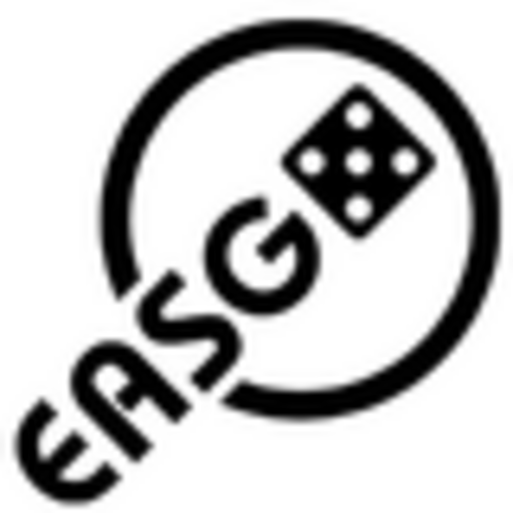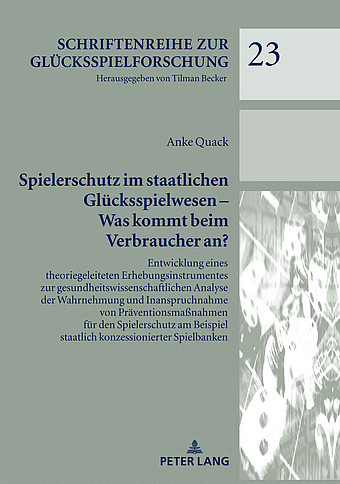Gambling Addiction Prevention
Principal investigator
Dr. rer. physiol. Anke QuackProject team
Lena Gieseke, M.Sc. (Research assistant)Research subject
Since 2008, the Competence Centre Player Protection & Preventions (Kompetenzzentrum Spielerschutz & Prävention (KSP)) have been developing and researching prevention- and intervention-oriented player protection measures and concepts at the Clinic and Polyclinic for Psychosomatic Medicine and Psychotherapy. Our interdisciplinary team consisting of psychologists, medical doctors and health communication scientists advises and accompanies state-licensed gambling providers in the development, implementation and evaluation of responsible gambling measures and concepts (social concepts) . Since 2010, we have been conducting certifications as accredited auditors according to the European Standard for Responsible Gaming of the European Lotteries and TOTO Association. KSPs research focus is on conducting consumer surveys on the utiliation and effects of universal, selective and indicated player protection measures (online and terrestrial). Quantitative and qualitative methods (focus groups) of empirical social research are applied.Current research projects
Evidence-Based Gambling Protection Communication: A Focus Group Evaluation of Information on the Topic of Gambling Addiction and Player Protection
Research findings from quantitative consumer surveys suggest that the reach of the prevention measures legally established under Section 6 of the State Treaty on Gambling (GlüStV) to prevent and combat gambling addiction in Germany is limited. The use of prevention- and intervention-oriented player protection measures by gamblers is at an average to low level. Even the group of problem gamblers, which is particularly relevant from a player protection perspective, is currently hardly reached by the player protection measures implemented in accordance with the GlüStV (Quack, 2020; Quack et al., 2022).
Research findings from quantitative consumer surveys suggest that the reach of the prevention measures legally established under Section 6 of the State Treaty on Gambling (GlüStV) to prevent and combat gambling addiction in Germany is limited. The use of prevention- and intervention-oriented player protection measures by gamblers is at an average to low level. Even the group of problem gamblers, which is particularly relevant from a player protection perspective, is currently hardly reached by the player protection measures implemented in accordance with the GlüStV (Quack, 2020; Quack et al., 2022).
The national and international demand for evidence-based health information (Lühnen et al., 2017) has also not yet been taken into account in the area of player protection communication in Germany. Thus, it has so far been neglected to include the perspective of sub-target groups relevant to player protection in the development of player protection information.
The object of the research project is to conduct focus group discussions with gamblers of different gambling intensity on the use and evaluation of the player protection measures implemented according to the GlüStV. It is planned to form three focus groups with about 6-8 participants per group: Casual gamblers (at least one gambling participation in the last 12 months), regular gamblers (gambling participation at least 3 - 4 times a month) and problem/pathological gamblers (Problem Gambling Severity Index (PGSI) ≥ 8, Ferrris and Wynne, 2001).
The object of the research project is to conduct focus group discussions with gamblers of different gambling intensity on the use and evaluation of the player protection measures implemented according to the GlüStV. It is planned to form three focus groups with about 6-8 participants per group: Casual gamblers (at least one gambling participation in the last 12 months), regular gamblers (gambling participation at least 3 - 4 times a month) and problem/pathological gamblers (Problem Gambling Severity Index (PGSI) ≥ 8, Ferrris and Wynne, 2001).
The discussion groups will examine in depth how gambling participants use offers of information on the topic of gambling addiction and player protection, how they evaluate the content and messages, and which information needs exist in the three player protection-relevant sub-target groups. Based on exemplary player protection measures, suggestions for improvement of the messages and measures of player protection communication will also be elaborated. Video recordings (image and sound) of the focus groups will be made and subsequently transcribed using the software f4transcript. Mayring’s (1991) qualitative content analysis approach will be used to analyze the data.
The research project thus aims to contribute to the further development of evidence-based, layman-comprehensible and target group-appropriate player protection communication and thus further increase the reach of player protection measures in sub-target groups relevant to player protection.
The research project thus aims to contribute to the further development of evidence-based, layman-comprehensible and target group-appropriate player protection communication and thus further increase the reach of player protection measures in sub-target groups relevant to player protection.
Duration: 2023
Funding: Land Brandenburg Lotto GmbH (partial funding)
Completed research projects
1. Gambling culture in Germany and implications for player protection: a representative study using the example of lottery customers in Rhineland-Palatinate
Since the GlüStV came into force, state-licensed gambling operators are obliged to implement player protection concepts and measures of universal, indicated and selective prevention. Over the past 10 years, the Deutsche Lotto- und Totoblock with its widespread distribution network has played a key role in setting nationwide standards for player protection. Furthermore, Lotto has the potential to reach large parts of the population with primary preventive player protection measures and to shape knowledge and attitudes regarding gambling participation and the gambling culture in Germany.The high social acceptance of lottery products and their widespread distribution offer ideal conditions for identifying gambling-related knowledge, attitudes and behavior - in this case also the application of preventive behavioral rules - in order to describe the gambling culture of the general population, to make statements about the acceptance or effectiveness of prevention messages, and to enable further development of player protection measures appropriate to the target group.
With the help of a representative survey in the distribution network of Lotto Rhineland-Palatinate, gambling-related attitudes and beliefs regarding gambling participation will be identified online and offline by means of a theory-based questionnaire. The knowledge of the central preventive messages for a responsible approach to gambling, the motives for participation and the proportion of problem gamblers will be analyzed. Furthermore, it will be investigated whether lottery customers use self-limiting strategies and whether there are differences between online customers and customers in retail outlets.
With the help of a representative survey in the distribution network of Lotto Rhineland-Palatinate, gambling-related attitudes and beliefs regarding gambling participation will be identified online and offline by means of a theory-based questionnaire. The knowledge of the central preventive messages for a responsible approach to gambling, the motives for participation and the proportion of problem gamblers will be analyzed. Furthermore, it will be investigated whether lottery customers use self-limiting strategies and whether there are differences between online customers and customers in retail outlets.
Funding: Lotto RLP
Publication:
Quack, A., Sielaff, M., Wejbera, M., & Beutel, M. E. (2022). Glücksspielsuchtprävention im staatlichen Glücksspielwesen: Werden Problemspielende erreicht?. Sucht, 68(3). doi.org/10.1024/0939-5911/a000766
Publication:
Quack, A., Sielaff, M., Wejbera, M., & Beutel, M. E. (2022). Glücksspielsuchtprävention im staatlichen Glücksspielwesen: Werden Problemspielende erreicht?. Sucht, 68(3). doi.org/10.1024/0939-5911/a000766
2. Telephone counseling for gambling addicts: acceptance and use of the Mainz behavioral addiction hotline
Telephone counseling services (hotlines) represent a central measure of indicated gambling addiction prevention worldwide [Kalke et al., 2012]. Characteristics of hotlines such as anonymity, distance, low time expenditure, no or low costs, location independence, and flexibility are intended to help reduce access barriers and facilitate the path to the addiction support system for affected individuals and their relatives [Meyer & Bachmann, 2017].Since October 2007, the Clinic and Polyclinic for Psychosomatic Medicine and Psychotherapy, University Medical Center Mainz, has offered a nationwide, free and, if desired, anonymous telephone counseling service for affected persons and relatives with a focus on problem gambling and computer game/internet behavior. The hotline is run by clinical psychologists with further training in therapy and is both an information and crisis hotline. It is available from Monday to Friday from 12 to 5 pm. The aim of the hotline is to provide low-threshold counseling and referral to further counseling and treatment facilities in the vicinity of the affected person's home. The telephone counseling service is intended to promote understanding of the disorder and motivation to change, and to reduce the thresholds for seeking further help.
Since 2008, state-licensed gambling providers in Germany have been required by law to offer a standardized nationwide telephone counseling service (Section 6 of the GlüÄndStV). However, research on the use and effects of such a service is still lacking.
Since 2008, state-licensed gambling providers in Germany have been required by law to offer a standardized nationwide telephone counseling service (Section 6 of the GlüÄndStV). However, research on the use and effects of such a service is still lacking.
The evaluation of calls to the behavioral addiction hotline (evaluation period 2013-2016) at the Clinic and Polyclinic for Psychosomatic Medicine and Psychotherapy, University Medical Center Mainz, aims to contribute to whether and to what extent telephone counseling services pave the way for gambling addicts into the addiction help system.
Funding: None.
Publications:
Aster, R., Quack, A., Wejbera, M., Beutel, M. E. (2018). Telefonische Beratung für Glücksspielsüchtige - der heiße Draht ins Hilfesystem? Akzeptanz und Nutzung der Mainzer Hotline Verhaltenssucht. Gesundheitswesen, DOI doi.org/10.1055/a-0592-7006
Funding: None.
Publications:
Aster, R., Quack, A., Wejbera, M., Beutel, M. E. (2018). Telefonische Beratung für Glücksspielsüchtige - der heiße Draht ins Hilfesystem? Akzeptanz und Nutzung der Mainzer Hotline Verhaltenssucht. Gesundheitswesen, DOI doi.org/10.1055/a-0592-7006
3. Player survey on the acceptance and use of preventive and intervention-oriented player protection measures in state-licensed casinos
The implementation of player surveys on the acceptance and use of universal, selective and indicated player protection measures is an important control instrument for the quality assurance and further development of the implemented prevention- and intervention- oriented measures in practice.There are currently only a few research findings on the effectiveness of player protection measures, especially in German-speaking countries. Within the scope of the player surveys, acceptance and use of player protection offers are recorded and related to gambling-related cognitions as well as the gambling behavior characteristics of the survey participants. The question of the extent to which sociodemographic factors such as gender, age, nationality and educational background influence the acceptance and use of player protection measures is also investigated.
The aim of the survey is to use empirical data to obtain concrete indications for the further development of player protection concepts and individual measures that are appropriate to the target group.
Funding: third-party funds state-licensed gambling operators.
Publications:
Quack, A. (2020). Spielerschutz im staatlichen Glücksspielwesen – Was kommt beim Verbraucher an?. Peter Lang Verlag. https://doi.org/10.3726/b17373
Publications:
Quack, A. (2020). Spielerschutz im staatlichen Glücksspielwesen – Was kommt beim Verbraucher an?. Peter Lang Verlag. https://doi.org/10.3726/b17373
Recent publications
- Aster, R., Quack, A., Wejbera, M., Beutel, M. E. (2018). Telefonische Beratung für Glücksspielsüchtige - der heiße Draht ins Hilfesystem? Akzeptanz und Nutzung der Mainzer Hotline Verhaltenssucht. Gesundheitswesen, DOI doi.org/10.1055/a-0592-7006.
- Quack, A. (2020). Spielerschutz im staatlichen Glücksspielwesen - Was kommt beim Verbraucher an? Schriftenreihe zur Glücksspielforschung, Band 23, Peter Lang Verlag, Berlin.
- Quack, A., Sielaff, M., Wejbera, M., & Beutel, M. E. (2022). Glücksspielsuchtprävention im staatlichen Glücksspielwesen: Werden Problemspielende erreicht?. Sucht, 68(3). https://doi.org/10.1024/0939-5911/a000766
- Wejbera, M., Müller, K. W., Becker, J., Beutel. M. E. (2017). The Berlin Inventory of Gambling behavior – Screening (BIG-S): Validation using a clinical sample. BMC Psychiatry, 17, 188.
Member of The European Association for the Study of Gambling (EASG)


